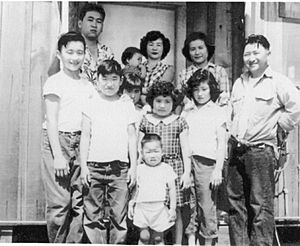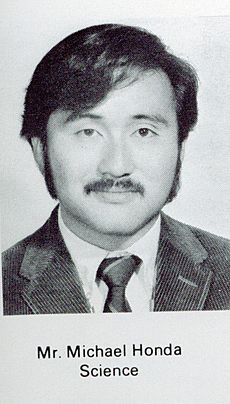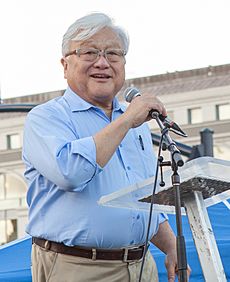Mike Honda facts for kids
Quick facts for kids
Mike Honda
|
|
|---|---|
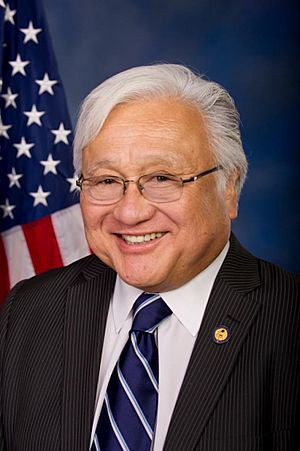
Official portrait, 2013
|
|
| Member of the U.S. House of Representatives from California |
|
| In office January 3, 2001 – January 3, 2017 |
|
| Preceded by | Tom Campbell |
| Succeeded by | Ro Khanna |
| Constituency |
|
| Vice Chair of the Democratic National Committee | |
| In office 2005–2013 |
|
| Leader | |
| Preceded by | Gloria Molina |
| Succeeded by | Tulsi Gabbard |
| Deputy Chair of the Democratic National Committee | |
| In office 2003–2005 Serving with Susan Turnbull
|
|
| Leader | Terry McAuliffe |
| Preceded by | Position established |
| Succeeded by | Keith Ellison (2017) |
| Member of the California Assembly from the 23rd district |
|
| In office December 2, 1996 - November 30, 2000 |
|
| Preceded by | Dominic Cortese |
| Succeeded by | Manny Diaz |
| Personal details | |
| Born |
Makoto Honda
June 27, 1941 Walnut Grove, California, U.S. |
| Political party | Democratic |
| Spouse | Jeanne (d. 2004) |
| Children | 2 |
| Education | San Jose State University (BA, MA) |
Michael Makoto "Mike" Honda (born June 27, 1941) is an American politician who was a member of the Democratic Party. He served in the U.S. Congress from 2001 to 2017, representing parts of California.
Before entering national politics, Honda had a long career in education. He started as a teacher and later became a school principal. His political journey began in 1971 when he was appointed to the San Jose Planning Commission. He later served on the Santa Clara County Board of Supervisors and in the California State Assembly.
During his time in Congress, Honda also held leadership roles in the Democratic National Committee (DNC), which is the main organizing group for the Democratic Party. In 2016, he was defeated for re-election by fellow Democrat Ro Khanna.
Contents
Early Life and Education
Mike Honda is a third-generation Japanese American, which means his grandparents moved to the United States from Japan. He was born in Walnut Grove, California, in 1941.
When Honda was just one year old, during World War II, his family was forced to live in a Japanese-American internment camp in Colorado called Camp Amache. This happened to many Japanese-American families at the time. After the war, in 1953, his family returned to California and became strawberry farmers in San Jose.
After high school, Honda joined the United States Peace Corps from 1965 to 1967. He served in El Salvador, where he learned to speak Spanish. When he returned, he finished his studies at San Jose State University. He earned a bachelor's degree in biology and Spanish, and later a master's degree in education.
For 30 years, Honda worked as an educator. He was a science teacher, a principal at two different schools, and a member of a local school board.
Political Career
From Local Government to Congress
Honda's career in public service began in 1971 when he was appointed to the San Jose Planning Commission. He was later elected to the San Jose Unified School Board in 1981, the Santa Clara County Board of Supervisors in 1990, and the California State Assembly in 1996.
In 2000, Honda was elected to the U.S. House of Representatives. He represented a district in California that included Silicon Valley, an area famous for its many technology companies. He was re-elected many times, serving a total of 16 years in Congress.
Work in Congress
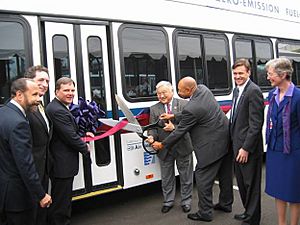
In Congress, a representative's job is to create laws and help decide how the government spends money. Honda served on several important committees, including the House Committee on Appropriations, which is in charge of funding for government programs.
He was a member of many groups, called caucuses, that focused on specific issues. He was a leader in the Congressional Asian Pacific American Caucus and founded the Congressional Anti-Bullying Caucus. He also co-founded the Congressional Ethiopia Caucus to build stronger ties with the African nation.
Key Issues and Legislation
During his time in Congress, Mike Honda worked on many laws and issues that were important to him.
Education
As a former teacher and principal, education was a top priority for Honda. In 2008, he worked with then-Senator Barack Obama to improve STEM (science, technology, engineering, and mathematics) education in schools. He believed it was important for students to learn these subjects to be ready for future jobs.
He also led a group called the Equity and Excellence Commission. This commission studied how to make sure all students, no matter where they live, have access to a great education and good teachers.
Environment
Honda worked to protect the environment. He helped secure federal money to clean up a former Air Force station on Mt. Umunhum in California. The site was cleaned of dangerous materials and was set to open to the public. He also supported programs to protect natural lands and water.
Human Rights
Honda was a strong advocate for human rights. He spoke out for the rights of American Muslims, especially after the September 11 attacks. He encouraged them to be proud of their identity and heritage. ..... This referred to women who were forced to work in military camps during World War II. His resolution called on the government of Japan to officially apologize and teach future generations about this history. The House passed the resolution in 2007.
LGBT Rights
Honda was a longtime supporter of equal rights for lesbian, gay, bisexual, and transgender (LGBT) people. He was a co-founder of the Congressional Equality Caucus, a group that works on issues affecting the LGBT community.
In 2015, he shared that his granddaughter, Malisa, is transgender. He spoke about the importance of making schools safe for all students and his pride in his granddaughter.
Technology and Privacy
Representing Silicon Valley, Honda was involved in technology policy. He supported net neutrality, the idea that internet service providers should treat all data on the internet equally.
He was also concerned about government surveillance and privacy. He co-sponsored the USA FREEDOM Act, a law that aimed to limit the government's ability to collect large amounts of data from people's phone calls and online activities.
Personal Life
Honda's wife, Jeanne, was a kindergarten teacher. She passed away in 2004. They had two children, Mark and Michelle. Honda is also a grandfather.
In February 2015, Honda announced that he was the proud "jiichan" (the Japanese word for grandpa) of a transgender grandchild. His public support for his granddaughter received positive attention around the world.
See also
- List of Asian Americans and Pacific Islands Americans in the United States Congress
 | Toni Morrison |
 | Barack Obama |
 | Martin Luther King Jr. |
 | Ralph Bunche |


